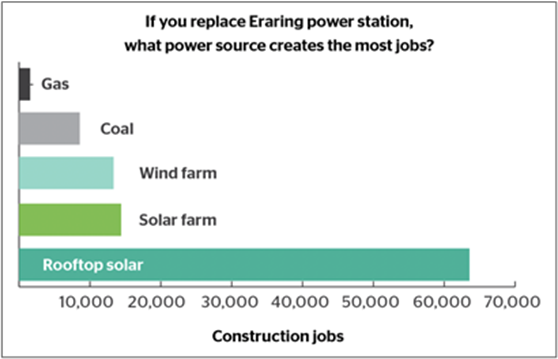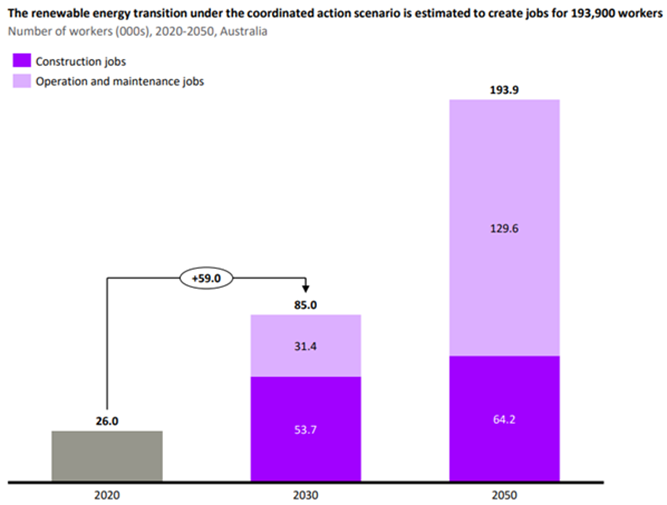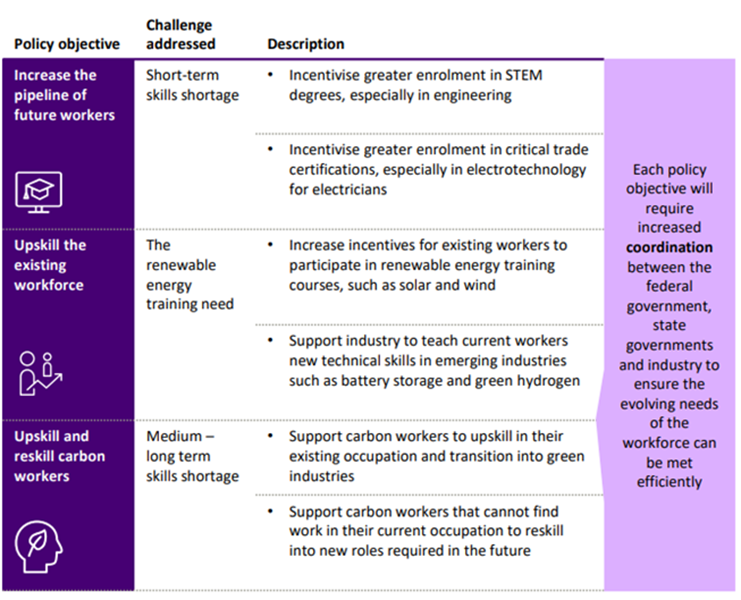As Australia accelerates its transition to renewable energy, the spotlight is on key players in the energy market to lead the energy transformation. As the jurisdictional planner for the NSW region of the National Electricity Market and transmission network service provider in NSW, Transgrid plays a pivotal role in transitioning NSW and the nation at large, to a sustainable future.
19 October 2023
The shift to a clean energy future isn't just about changing how we generate electricity—it's also about creating job opportunities, upskilling our workforce, and strengthening our regional economy.
Guided by insights from the Clean Energy Council's report, 'Skilling the Energy Transition', we're poised to open up new pathways into the renewable sector for people across the state. Complementing this approach are our diverse career programs and our new Legacy 100 initiative, a bold step aimed at creating a resilient, home-grown transmission line workforce.
Join us as we explore the steps we're taking to invest in the nation’s renewable future, creating a sustainable and prosperous future for NSW and Australia.
The path forward: renewable energy as a job powerhouse
The renewable energy transition offers a potent opportunity to energise our job market. It's not just about producing clean, sustainable energy - it's about fueling growth in regional communities, powering up new career pathways, and building a stronger economy. The Australian Conservation Foundation (ACF) underscores this point in its study, 'Renewable Energy is the Real Jobs Winner'.
According to this report, replacing Australia's largest coal-fired power station, Eraring, with renewable sources could generate thousands of new jobs, far outpacing the employment potential of traditional coal or gas plants. In the graph below, ACF illustrates the stark contrast in job potential between replacing Eraring with renewable energy sources and doing so with coal and gas.
 Source: Australia Conservation Foundation, Renewable Energy is the Real Jobs Winner
Source: Australia Conservation Foundation, Renewable Energy is the Real Jobs Winner
These figures demonstrate that embracing solar and wind power not only promotes sustainability but also creates substantial job opportunities that are future-proof, making them excellent choices for upskilling initiatives.
So, not only are renewables a winner for our environment, but they're also a game-changer for our job market. But what kinds of jobs are we talking about?
Explosive job growth: harnessing wind, solar, and beyond
The renewable energy industry offers opportunities across various broad categories, from wind farms to rooftop solar, from large utility-scale projects to small organisations, and from capital cities to regional areas. The different types of roles and skill requirements include technical and engineer roles, business and support roles, as well as tradespeople and technicians.
With an abundance of renewable resources and a growing appetite for clean energy, NSW is well-positioned to capitalise on these job opportunities. A recent Minster Ellison report showed that 60% of local and international renewables investors see NSW as the most attractive state to invest in.
Given that in most states, around two thirds of renewable energy jobs to 2035 could be in regional or remote areas, by strategically harnessing wind, solar, and beyond, we can drive our regional economies forward and create vibrant, prosperous communities across the state.
The questions remains: How many jobs can be generated from clean energy?
The Australian clean energy industry is clearly experiencing a remarkable boom, leading to a surge in job opportunities and a growing need for skilled professionals. The Skilling Australian Industry for the Energy Transition report estimates that currently there are approximately 26,000 workers employed in renewable energy across Australia. Due to large initial investments modelled through the coordinated action scenario across the Australian energy system, an additional 59,000 workers will be required to support the construction and ongoing O&M (Operations and Maintenance) of key renewable energy infrastructure.
Looking ahead, if all planned projects come to fruition (the High Distributed Energy Resources, or High DER, Scenario), this number could blossom to 193,900 jobs by 2050, and 23% could be located in NSW.

Source: The Skilling Australian Industry for the Energy Transition report (2023)
Shaping the clean energy workforce: Transgrid’s approach
As we've seen, the renewable energy sector is a powerhouse for job creation. But these jobs require a new breed of skills and training. As a leader in the energy sector, as well as the operator and manager of Australia’s largest electricity transmission network, we're committed to shaping a competent, resilient energy workforce that's prepared for the future. Our diverse career programs and initiatives like Legacy 100 are testament to this commitment.
Transgrid offers an empowering work environment where collaboration, innovation, and knowledge-sharing are highly valued. Our diverse workforce, reflecting the communities we serve, brings together individuals from various backgrounds and perspectives. We believe in fostering an inclusive workplace that values our people and encourages personal and professional growth.
In addition to our regular job vacancies, we offer specialised programs to nurture talent and develop skills for the clean energy future:
- Apprenticeship Program: Our apprenticeship program offers a valuable opportunity to gain hands-on experience and technical skills in fields such as electrical substations, transmission lines, and electronics and communication. With a supportive environment and industry-leading training, apprentices can kick-start their careers and work on significant infrastructure projects that shape Australia's energy industry.
- Pre-apprenticeship Program for Women: Our current skills shortage is partially due to the low representation of women (women accounted for just 13% of the engineering workforce despite representing 51% of the total workforce). That’s why we launched this program in 2021 for women aged from 16 years, as part of our commitment to increase diversity in the energy industry. This seven-week course provides pathway for women that want a head start on their electrical apprenticeships, as well as a competitive edge against other applicants should they decide to commit to a full apprenticeship.
- Graduate Program: Our award-winning graduate program provides a unique opportunity to learn from industry experts, contribute to impactful projects, and develop essential professional skills. This two-year program offers diverse and challenging responsibilities, structured learning and development pathways, and a supportive environment. Graduates play a vital role in connecting Australia to a renewable energy future while enjoying flexibility, work-life balance, and access to various well-being programs.
- Workforce Development Strategic Partnership: Transgrid and the Regional Development Australia (RDA) Riverina are investing $1.5 million to enhance the Riverina community’s economic and employment prospects. Initiatives include expanding the Riverina Liveability Hub, fostering youth opportunities, and addressing labour and skill shortages in connection with upcoming energy infrastructure projects.
- CSU Engineering Scholarship: Transgrid has partnered with Charles Sturt University, committing $2 million through the Transgrid Engineering Scholarship Fund. This initiative supports the education of 100 future engineers, such as those wishing to major in the Electrical Engineering stream, at the university's Bathurst campus from 2023 to 2029, aiding in bridging the skills gap in the infrastructure sector in regional Australia. The fund also offers hands-on experiences through cadet placements in regional New South Wales.
- University of Newcastle Partnership: This collaborative effort with the University of Newcastle aims to create comprehensive education, training, and employment avenues for students in the Hunter region. Initiatives include scholarships, cadetships, and research opportunities focused on electrical engineering, paving the way for a highly skilled workforce with substantial industry connections, while also fostering a smooth transition for individuals from other industries to the transmission sector.
- The Legacy 100 Initiative: Initiated by our construction partner SecureEnergy and Transgrid, Legacy 100 is a groundbreaking training program aimed at upskilling the power transmission sector in regional NSW. Through this initiative, we will train up to 100 candidates in Transmission Line Construction, equipping them with the qualifications and expertise needed for the $1.8 billion EnergyConnect project that’s being built from Wagga Wagga to the South Australian border.
The aim of this extensive initiative is to support the growth of riggers and doggers within the Australian energy sector. By doing so, it will enhance employment opportunities and skill development in regional NSW, while decreasing dependence on internationally trained workers.
Legacy 100 is set to play a pivotal role in cultivating the future workforce of the transmission tower construction industry. Workers involved will acquire invaluable skills and experience that will be instrumental in constructing upcoming transmission line projects.
Conclusion
As Australia strides towards a greener economy, the surge in demand for clean energy jobs highlights a pressing need for coordinated strategies to address skill shortages. Since 2020, the government and industry sectors have taken significant steps to bridge the skills gap through various funding and training initiatives, both on a federal and regional level.
Looking ahead, it's essential to focus on three vital objectives:
- encouraging more STEM enrolments,
- upskilling the current workforce in emerging energy sectors,
- and aiding the transition of carbon workers into green industries.
This approach aims to create a skilled workforce capable of meeting Australia's evolving energy demands effectively and efficiently.

Source: Australian Industry Energy Transitions Initiative Report
In sync with these national efforts, Transgrid is a key player in steering the shift towards renewable energy in NSW. We are committed to fostering an energy workforce that not only aligns with governmental strategies but also pioneers new pathways in the industry.
Through a comprehensive range of programs and initiatives, we aim to carve a sustainable future for Australians, creating opportunities for individuals to launch meaningful careers in the growing clean energy sector. Leveraging apprenticeships and graduate programs, we are fostering a space where innovation meets impact, nurturing the next generation of energy professionals ready to make a substantial difference.
Interested in joining Transgrid? Find out how you can play an important part in Australia’s clean energy transformation by exploring current vacancies on our Careers page or go to Jobs Riverina Murray.
